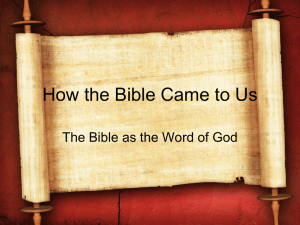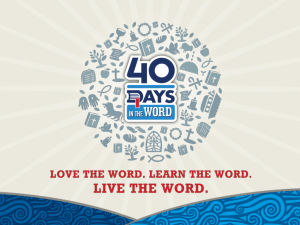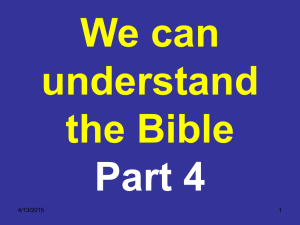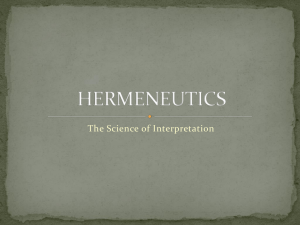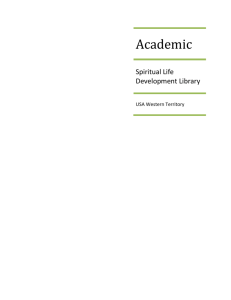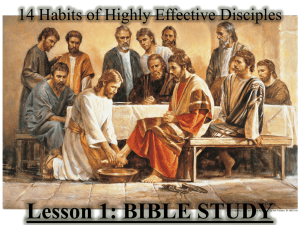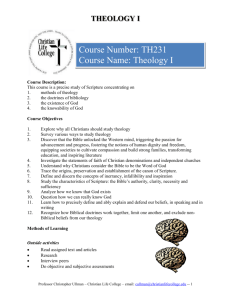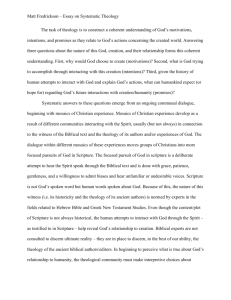Go to Resource - Scientists In Congregations
advertisement
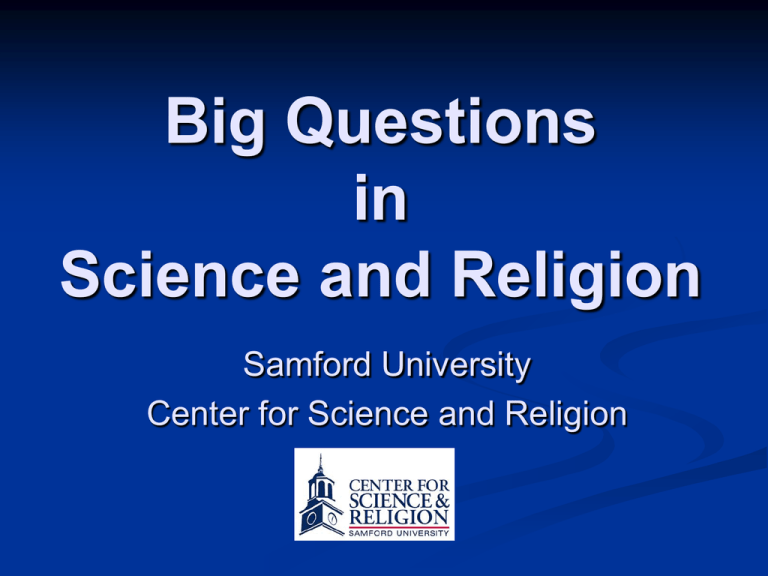
Big Questions in Science and Religion Samford University Center for Science and Religion Relationships between Science and Religion Big Questions in Science and Religion Samford University Center for Science and Religion What is Science? •The word scientia originally meant general knowledge and was inferior to sapientia which meant wisdom •Science as an occupation did not appear until the 19th century •Before the 19th century, many scientists sought to provide evidence for religion (natural philosophy) Image source: http://publishingarchaeology.blog spot.com/2012/01/rejected-byscience_27.html (fair use) A Definition of Science Acquisition of reliable but not infallible knowledge of the real world, including explanations of the phenomena Science is a process, not a body of knowledge Science is always tentative (what hasn’t been disproved) Science deals with empirical knowledge Science includes explanations in the form of hypotheses, theories, and laws Image source: http://www.amazon.com/ScientificEndeavor-Primer-PrinciplesPractice/dp/0805345965/ref=sr_1_1?s=boo ks&ie=UTF8&qid=1358951332&sr=11&keywords=scientific+endeavor (fair use) What is Religion? •The word religio initially meant an inner piety or desire to lead a Christ-like life •Religion as a body of beliefs and practices appeared around the 17th century, partially as a result of the Protestant Reformation Image source: http://www.eurasiareview.com/25022011religion-and-terrorism-a-socio-historicalreconsideration/ (fair use) A Definition of Religion A strong belief in a supernatural power or powers that control human destiny An institution to express belief in a divine power A belief concerning the supernatural, sacred, or divine, and the practices and institutions associated with such belief The sum total of answers given to explain humankind’s relationship with the universe How Do We Know Things in Science? Experiments seek to control all (or almost all) variables associated with a phenomenon Observation of phenomena that can’t be controlled (paleontology, cosmology, ethology) together with reason Evidence is reported in peer-reviewed journals available to all Best explanations are predictive Image source: http://www.tutorvista.com/content/physics/physic s-iv/optics/interference-light.php (fair use) How Do We Know Things in Religion? Sacred texts are inspired by divine power Individual revelation through visions, dreams, prayer, events Reason about the nature of God and the relationship between God and humans Study of sacred texts and the conditions under which they were written Study of the natural world? Image source: http://news.gts.edu/2012/05/deirdregood-joins-interfaith-presentation-on-sacredtexts/sacred-texts/ (fair use) Worldviews We all have belief systems that influence how we answer the important questions of life Range of views within Christianity, Judaism, agnosticism, relativism, Buddhism, atheism, Islam Scientists also have worldviews (paradigms) that determine the questions they investigate Are there differences in worldviews between science and religion? Image source: http://www.eurasiareview.com/25 022011-religion-and-terrorism-asocio-historical-reconsideration/ (fair use) Scientific and Christian Beliefs Beliefs Needed for Science Nature can be studied by humans Nature works by natural cause and effect Natural phenomena are repeatable/observable Experiments and observations are needed for explanation Source: Haarsma and Haarsma, Origin: A Reformed Look at Creation, Design, and Evolution (Grand Rapids, MI: Faith Alive, 2007) Christian Beliefs Humans are made in the image of God God rules the world in a faithful, consistent manner God has established natural laws Humans are not able to understand God’s world completely How Do Science and Religion Relate to Each Other? Ian Barbour identified four ways Conflict Independence Dialogue Integration From Barbour, Religion and Science: Historical and Contemporary Issues (New York: HarperCollins, 1997) Image source: http://www.amazon.com/Religi on-Science-Gifford-LecturesBarbour/dp/0060609389/ref=sr _1_1?s=books&ie=UTF8&qid =1358952534&sr=11&keywords=religion+and+sci ence+ian+barbour (fair use) Conflict Religion and science are two ways of viewing the same things; therefore one is correct and the other is incorrect Both are based on interpretation of the Bible Scripture is inerrant in everything it comments on and if science appears to contradict the Bible, science is wrong (Biblical literalism or inerrancy) Parts of the Bible are contradicted by science, so all of the Bible must be rejected and therefore science is the only reliable path to knowledge of the real world (scientism, philosophical materialism) Image source: http://www.conflictdynamics.org/blog/tag/office-conflict/ (used with permission) Conflict Scientific Materialism Scientific method is the only reliable path to knowledge Matter (or matter and energy) is the fundamental reality in the universe Science can be reduced to chemistry and physics Image source: http://www.boston.com/jobs/galle ries/workplaceconflict/ (fair use) Conflict In order to accept this model, scientific materialists must believe that: they are completely neutral with respect to their biases and worldviews all of life, including the arts, social sciences, and others, is reducible to physical processes that there is a single way of interpretation of the Bible, and that it is mistaken Are these true? Conflict Biblical Literalism Scripture is inerrant in everything it comments on If science appears to contradict the Bible, science is wrong Image source: http://www.maximumadvantage.com/conflict-resolution-in-theworkplace.html (fair use) Conflict In order to accept this model, Christians must believe that: there are no conflicts, inaccuracies, or contradictions in the Bible scientists are mistaken or purposely fraudulent in their investigations into origins (and origins alone; i.e., not with respect to medicine, technology et al.) scientists are hostile to Christianity (or religion) Are these true? Image source: http://heatherdhawkins.blogspot.com/2 009/05/clergy-letter.html (fair use) Independence Contrasting Methods Science and religion are separate spheres of human life Religious faith depends on divine initiative, science relies on human discovery Science is thought to be testable, public, and objective while religion is not testable, private, and subjective Image source: http://www.bethinking.org/sciencechristianity/ways-of-understanding-science-andreligion.htm (fair use) Independence Differing Languages Scientific language is used primarily for prediction and control (theories, delimited questions) Religious language elicits a set of attitudes and encourages allegiance to moral principles Religious language often deals with liberation from suffering and experiences of peace and unity (not scientific) What it means: science will discover/explain everything it can, and religion will explain the rest Independence Problems with this model: people generally like to be consistent in their beliefs For Christians, God is sovereign over everything, not just the non-scientific part of life Where should evolution be placed? Image source: http://www.loc.gov/exhibits/treasures/trt024.html (fair use) Independence Does Scripture influence interpretation of science? May be a misuse to read into the Bible things it may not intend to teach (farming, economics, weather, e.g.) The Bible tells us to look beyond science for explanations Does science influence interpretation of Scripture? May be a misuse to ignore parts of Bible that conflict with science Scientific findings can change and improve understanding of Scripture Image source: http://defendchristianfaith.blogspot.com/201 2/04/science-and-religion-do-mix.html (fair use) Dialogue Methodological parallels Religion and science are alike in certain ways: religion is not necessarily completely subjective and science is not necessarily completely objective Scientists are not just passive observers (quantum mechanics) If God created the world and humans, God meant for humans to know the world Image source: http://en.wikipedia.org/wiki/Dialogue (fair use) Dialogue Nature-centered spirituality Some scientists have had spiritual experiences in the study of nature (Copernicus, Rachel Carson) Image source: http://ircamera.as.arizona.edu/NatSci102/N atSci102/lectures/copernicus.htm (fair use) Image source: http://www.rachelcarson.org/ (fair use) Dialogue Intelligibility and contingency can be areas of dialogue: neither is completely answerable by scientific methods God is the primary cause and works through secondary causes, which science can describe Avoids God of the gaps, since science is complete on its own In order to accept this model, Christians and scientific materialists must be open to the other’s viewpoint Integration Natural theology Existence of God can be inferred from design in nature, which science has helped us see God can be viewed as the Designer of a self-organizing system Theology of nature Main sources of theology are outside science, but scientific theories may affect the reformulation of certain doctrines, particularly creation and human nature “new natural theology” doesn’t offer arguments for the existence of God but focuses on features of the universe as a whole (Polkinghorne) Example: fine tuning of the universe is luck, multiple universes, or creation with conditions for evolution Image source: http://incharacter.org/features/johnpolkinghornes-unseen-realities/ (fair use) Integration Systematic synthesis Science and religion both contribute to an inclusive metaphysics, such as in process philosophy Potential problem with the type of God nature implies (deist vs. personal) Image source: http://evolve4peace.com/2012/10/02/science-and-religion/ (fair use) Integration In order to accept this model, science and religion must be of equal (or nearly equal) importance In order to accept this model, both Christians and scientists must be willing to modify some of their views in light of new evidence and thinking Image source: http://whatafy.com/science-andreligion-sworn-enemies.html (fair use) Other views of the relationship between science and religion Mikael Stenmark Relationship between science and religion is dynamic, so discrete borders are hard to draw Image source: http://www.crs.uu.se/Resea rch/impactofreligion/Theme _6/Customized+Science+I %3A+ValueFree+versus+ValueDirected+Science/?languag eId=1 Photo credit Max Marcus, Uppsala University Used with permission Photo credit Max Marcus, Uppsala University Used with permission Nancey Murphy Five-fold typology related to Niebuhr’s interactions between religion and culture States that theology can influence science Image source: http://www.iscast.org/even t_2011_08_19_Annual_Le cture_Vic Other views of the relationship between science and religion John Haught Conflict, contrast, contact, and confirmation Confirmation tells of theology’s effects on philosophical assumptions of science Ted Peters Eight-fold typology emphasizing history, ethics, and New Age spirituality Claims that only science can produce new knowledge Image source: http://polyskeptic.com/ tag/john-haught/ (fair use) Image source: http://spacetheology.blogsp ot.com/2012/04/professorted-peters.html (fair use) How Do We Evaluate Claims Made by Religion and Science? Critical thinking helps us determine the which claims are more likely to be true Being aware of our own thinking (and our own biases, cultural values, etc.) can help us evaluate claims also Looking for the strengths and weaknesses of others’ arguments and our own can help us determine the truth of conflicting claims Examples of weaknesses in claims? Fallacies Associated with Religion and Science Begging the question: the conclusion is used as one of the premises (circular reasoning) False dilemma: presumes only two alternatives exist when there may be more than two From Schick and Vaughn, How to Think About Weird Things: Critical Thinking for a New Age, (New York: McGraw-Hill, 2011) Image source: http://www.amazon.com/How -Think-About-WeirdThings/dp/007353577X/ref=s r_1_1?s=books&ie=UTF8&qi d=1358953931&sr=11&keywords=schick+and+va ughn (fair use) Fallacies Associated with Religion and Science Appeal to authority: the use of experts’ opinions in a field in which they are not experts Appeal to the masses: argument must be true if a large number of people believe it to be true Fallacies Associated with Religion and Science Appeal to tradition: argument that something must be true because it’s part of an established tradition Appeal to ignorance: opponents’ inability to disprove a conclusion is proof of its incorrectness Appeal to fear: use of harm to advance one’s position Straw man: misrepresenting someone’s claim to make it easier to dismiss or reject Fallacies Associated with Religion and Science Faulty analogy: using analogy without looking at dissimilarities Slippery slope: performing one action necessarily leads to additional bad actions Image source: http://gavinortlund.wordp ress.com/2012/04/18/au gustines-intellectualdevelopment/ (fair use) From St. Augustine. . . “If [people outside the faith] find a Christian mistaken in a field which they themselves know well and hear him maintaining his foolish opinions about our books, how are they going to believe those goods and matters concerning the resurrection of the dead, the hope of eternal life, and the kingdom of heaven, when they think their pages are full of falsehoods on facts which they themselves have learned from experience in the light of reason?” Conclusion In thinking critically about Christianity and evolution we need to: realize that there are more than two positions carefully consider claims, whether they agree with our position or not consider whether biases are affecting a claim, either our own biases or those of another Conclusion In thinking critically about Christianity and evolution we need to: use reason as well as emotion in evaluating claims trust (at least provisionally) the opinions of experts, but only in their areas of expertise have the humility to admit that we may be wrong (after all, there are a variety of views already) Questions Which of the ways of knowing are you most comfortable with? The media tend to emphasize the conflict model. Why do you think this is so? Is this the most common model? What is the role of reason in religion? In what ways does science seem like a religion? Relationships Between Science and Religion George E. Keller III, Ph.D. Samford University Conditions of Use The slides contained in this presentation and the accompanying notes are freely available for use and/or modification by individuals and groups to promote understanding and dialogue in science and religion with the stipulation that they may not be sold or traded individually, collectively, or otherwise for any form of financial or material gain. The source of all images in this collection of slides is either noted directly (if required by the author) or may be viewed by clicking an image (in edit mode) and then clicking “Send to Back.” These forms of crediting images must be included in any use or derivation of these materials. The contents of these slides and the accompanying notes reflect the views of the author and should not be assumed to represent the position of Samford University or its employees.

